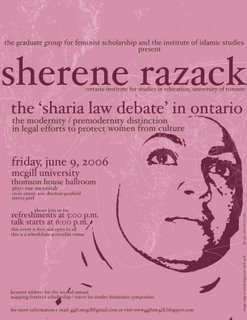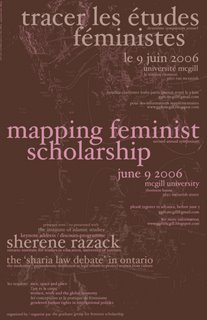Mapping Feminist Scholarship / Tracer les Études Féministes
REVISED SCHEDULE / HORAIRE RÉVISÉ
last update: 5 june 2006
Here is the revised schedule for the second annual "mapping feminist scholarship / tracer les études féministes" symposium, to be held on Friday June 9 at Thomson House, 3650 rue McTavish (see map).
8h30 Registration / Inscription
9h00 Welcome / Bienvenue
Shree Mulay, Director/Directrice, McGill Centre for Research and Teaching on Women
9h15 – 10h30 Session 1: Race, Space, and Place
[1] Tracey Nicholls, Centre de Recherche en Éthique, Université de Montréal: Following Haiti's Lead: Radical possibilities for de-ontologizing race and gender
[2] Aiyyana Maracle, McGill Centre for Research and Teaching on Women, McGill University: Indigenous Contemporary Realities: Neocolonialism and Decolonization
[3] Sarah Waisvisz, Department of English, McGill University: Fugitive Rhythms: Re-Imagining Diasporic Caribbean Canadian Communities in Dionne Brand's 'What We All Long For'
10h30 Coffee break / Pause-Café
10h45 – 12h00 Session 2: L'art et le corps
[1] Catherine Girard, Département d'histoire de l'art, Université de Montréal: Les résistances d'un portrait: vers une décolonisation de l'histoire de l'art
[2] Alex Anber, Department of Art History, Concordia University: Mona Hatoum's Corps étranger
[3] Rachel Lauzon, Département d'histoire de l'art, Université Concordia: Identité, corporalité et automatisation: La répresentation du corps chez Vanessa Beecroft et les enjeux qu'elle soulève
12h00 Lunch / Dejeuner
12h45 – 13h45 Session 3: Women, Work and the Global Economy
[1] Marlène Elias, Department of Geography, McGill University: Bridging Women's Worlds: Global Markets, Fair Trade, and African Shea Butter
[2] Anjali Abraham, Department of Integrated Studies in Education, McGill University: What's love got to do with it? Women, Teaching and Global Education Reform
13h50 – 14h50 Session 5. Les conceptions et la pratique du féminisme
[1] Eve-Marie Lampron, Département d'Histoire, Université de Montréal: Entre solidarité feminine et solidarités féministes: enjeux théoriques et applications pratiques
[2] Debbie Lunny, Humanities Program, Concordia University : Un/learning solidarity through transnational feminist activism
14h50 Break / Pause
15h05 – 16h05 Session 4: Gendered Human Rights in International Politics
[1] Joshua Philbrook, Department of Political Science, Concordia University : Western Wombs, African Aliases
[2] Benjamin Persett, Department of Political Science, University of Connecticut: Speaking Queerly: U.S. Foreign Policy Making, Queer Theory, and the Human Rights of Sexual Minorities
17h00 Reception / Réception *
18h00 – 19h30 Keynote Address /Discours-Programme *
Sherene Razack, Sociology and Equity Studies in Education (SESE), Ontario Institute for Studies in Education (OISE), University of Toronto: The 'Sharia Law Debate' in Ontario: The Modernity/Premodernity Distinction in Legal Efforts to Protect Women From Culture
See Keynote abstract/biography here (or scroll down...) (désolée, le résumé et l'historique sont disponibles seulement en anglais pour le moment).
* présenté avec l'Institut d' études islamiques, Université McGill / co-presented with the Institute of Islamic Studies (IIS), McGill University.
SCHEDULE/HORAIRE
8h30 Registration / Inscription
9h00 Welcome / Bienvenue
Shree Mulay, Director/Directrice, McGill Centre for Research and Teaching on Women
9h15 – 10h30 Session 1: Race, Space, and Place
[1] Tracey Nicholls, Centre de Recherche en Éthique, Université de Montréal: Following Haiti's Lead: Radical possibilities for de-ontologizing race and gender
[2] Aiyyana Maracle, McGill Centre for Research and Teaching on Women, McGill University: Indigenous Contemporary Realities: Neocolonialism and Decolonization
[3] Sarah Waisvisz, Department of English, McGill University: Fugitive Rhythms: Re-Imagining Diasporic Caribbean Canadian Communities in Dionne Brand's 'What We All Long For'
10h30 Coffee break / Pause-Café
10h45 – 12h00 Session 2: L'art et le corps
[1] Catherine Girard, Département d'histoire de l'art, Université de Montréal: Les résistances d'un portrait: vers une décolonisation de l'histoire de l'art
[2] Alex Anber, Department of Art History, Concordia University: Mona Hatoum's Corps étranger
[3] Rachel Lauzon, Département d'histoire de l'art, Université Concordia: Identité, corporalité et automatisation: La répresentation du corps chez Vanessa Beecroft et les enjeux qu'elle soulève
12h00 Lunch / Dejeuner
12h45 – 13h45 Session 3: Women, Work and the Global Economy
[1] Marlène Elias, Department of Geography, McGill University: Bridging Women's Worlds: Global Markets, Fair Trade, and African Shea Butter
[2] Anjali Abraham, Department of Integrated Studies in Education, McGill University: What's love got to do with it? Women, Teaching and Global Education Reform
13h50 – 14h50 Session 5. Les conceptions et la pratique du féminisme
[1] Eve-Marie Lampron, Département d'Histoire, Université de Montréal: Entre solidarité feminine et solidarités féministes: enjeux théoriques et applications pratiques
[2] Debbie Lunny, Humanities Program, Concordia University : Un/learning solidarity through transnational feminist activism
14h50 Break / Pause
15h05 – 16h05 Session 4: Gendered Human Rights in International Politics
[1] Joshua Philbrook, Department of Political Science, Concordia University : Western Wombs, African Aliases
[2] Benjamin Persett, Department of Political Science, University of Connecticut: Speaking Queerly: U.S. Foreign Policy Making, Queer Theory, and the Human Rights of Sexual Minorities
17h00 Reception / Réception *
18h00 – 19h30 Keynote Address /Discours-Programme *
Sherene Razack, Sociology and Equity Studies in Education (SESE), Ontario Institute for Studies in Education (OISE), University of Toronto: The 'Sharia Law Debate' in Ontario: The Modernity/Premodernity Distinction in Legal Efforts to Protect Women From Culture
See Keynote abstract/biography here (or scroll down...) (désolée, le résumé et l'historique sont disponibles seulement en anglais pour le moment).
* présenté avec l'Institut d' études islamiques, Université McGill / co-presented with the Institute of Islamic Studies (IIS), McGill University.




